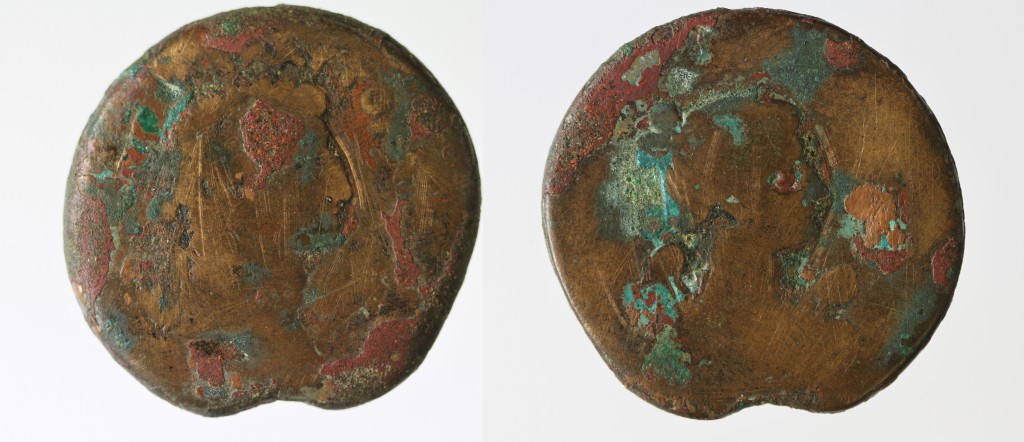December 24, 2015, by Will Leveritt
On this day in 3BC the Roman emperor Galba was born
Text by Benedict Segal
Image by Sarah Jordan
“The race of the Caesars ended with Nero” states Suetonius at the beginning of his Life of Galba. On this day in 3 BC, the man who would succeed Nero as Roman emperor, Servius Sulpicius Galba, was born.

AE drachm of Alexandria. Obverse has laureate head of emperor right, [SEPOVI GALBA] AVTOK [KAIS SEBA]. Reverse has bust of Nike right. 36mm, 12 o’clock.
According to an unlikely anecdote, Augustus himself prophesied Galba’s future eminence. In his Life of Galba, Suetonius writes that when as a boy Galba was paying his respects to the emperor, Augustus singled him out, allegedly saying “you too will taste a little of my glory, child”. (Tacitus and Cassius Dio, however, both claim Tiberius was the emperor who made this remark, when Galba was an adult.)
Details of Galba’s early political career are sketchy, yet it is clear enough that he was an ambitious Roman who sought to make his way up the cursus honorum. He is said to have begun climbing the ladder before the legal minimum age; perhaps this was the result of the favour in which he is said to have been held by Livia Augusta (Augustus’ wife and, after his death, a kind of dowager empress). He was praetor in AD 20, during which office he held games at which elephants were made to walk on ropes for the enjoyment of the public.
He reached the consulship in AD 33 under Tiberius and thereafter held the governorships of Germania Superior (under Caligula) and later Africa (under Claudius). In both these posts he gained a reputation for both integrity and, in the military sphere, old style strictness and discipline. He received rewards and honours for his services. Galba retired to private life under Nero until AD 61, when the emperor gave him the governorship of Hispania Tarraconensis, the province from which he would later launch his bid for the throne. He ruled the province for seven years.
The event that would lead him to the emperorship began later that year: the rebellion of the governor of Gallia Lugdunensis, Gaius Julius Vindex. Vindex revolted and sent a request to Galba not simply to join him, but to declare himself emperor.
Galba’s displeasure with Nero’s misgovernment played a part in his decision to do exactly that. But he was also aware that Nero, anxious to remove anyone of distinguished birth and noble achievements, had ordered his execution. While still in Spain, Galba held a public meeting at which he was proclaimed emperor, though he positioned himself as merely a representative of the Senate and people of Rome. For the moment, he refused the title of emperor.
However, when Vindex was defeated in battle by forces loyal to Nero and subsequently committed suicide, Galba wavered. Suetonius claims he even considered suicide. Nero’s own death in June AD 68 restored Galba’s confidence and he marched to Rome.
Galba, at 71, was now master of the Roman world. However, once he had firmly established himself in power, he set about alienating almost everyone. A key priority was to balance the empire’s finances. To do this he made a number of deeply unpopular choices: he increased taxes, and refused to pay the Praetorian Guard the now traditional donative (a gift of money), which they were accustomed to receive from the emperor they protected. The ancient sources also claim that he put to death a number of knights and senators on flimsy grounds.
The ordinary soldiers of the legions also did not receive the rewards they had been expecting for supporting his bid for the throne; the soldiers in Germania Superior were especially angry that they had not been rewarded for their services against Vindex, and they were the first to revolt against the new emperor, in January AD 69, sending a message to the Praetorian Guard in Rome that they ought to get rid of Galba and replace him with someone else.
This someone else would turn out to be Marcus Salvius Otho, who had governed the neighbouring province of Lusitania when Galba was ruling Spain, and had backed him when he took over from Nero. Otho seems to have been angered by the fact that the childless Galba had not adopted him as his son and heir, opting instead for a young noble named Piso.
Otho had been in contact with the Praetorian Guard, had presented himself to the guardsmen at their camp in Rome, and secured their support. The elderly emperor was made aware of this crisis, but was lured into the streets by false claims that Otho had been dealt with. When he appeared in the Forum Romanum a cavalry unit, which had been waiting for the elderly emperor, bore down upon him and cut him to pieces. He was killed aged 72, in January AD 69, after only seven months in power.
His murder sparked a short civil war between several claimants to the throne, from which Vespasian and his Flavian dynasty would ultimately emerge victorious.
No comments yet, fill out a comment to be the first

Leave a Reply